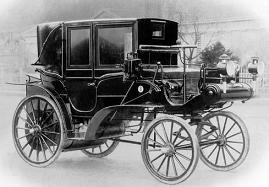
On May 20, 1899, German, a New York City cab driver, was charging down a Manhattan street in his electric car when he was pulled over by a bicycle cop. It was then that German became the proud recipient of the first-ever speeding citation in the U.S.
His speed? A whopping 12 mph. (The limit was 8 mph.) His punishment? A night in the slammer.
While there is some contention, most agree that German did not receive a paper ticket. It took some years before legislators decided that jail time was an impractical solution to speed infractions so it wasn’t until 1904 that an Ohio man by the name of Harry Myers became the first person in the U.S. to receive a speeding ticket. He was also doing 12 mph in an 8 mph zone. It is unclear how much the ticket was for.
The concept of a speed limit had been in place in the U.S. for more than three centuries. As early as 1652, the colony of New Amsterdam (which we now call New York) had passed a law that “no wagons, carts or sleighs shall be run, rode, or driven at a gallop.” The penalty for speeding started at “two pounds Flemish.” Interestingly, this is estimated to be about the same price as some speeding fines today: $150.
Nowadays, police officers use technology to monitor and calculate traffic speeds, but in the days of Myer and German, they used watches. A cop would use a stopwatch when a vehicle passed one of two artificial markers or landmarks that were a known distance apart and a little grade school math would determine the speed.
Brian Traynor of the U.S. Department of Transportation’s Office of Enforcement and Emergency Services offered one particularly interesting story of how early cops would catch speeders:
“New York City Commissioner William McAdoo set up a series of three dummy tree trunks at one-mile intervals along the Hudson Drive. A police officer equipped with a stopwatch and a telephone was concealed inside each fake tree. When a car sped past the first station, the officer inside telephoned the exact time to the officer in the next tree. The second officer set his watch accordingly. When the car passed his post, he computed its speed for the mile. If the speed was above the limit, he telephoned the officer in the third tree, who lowered a pole across the road and stopped the car.”
Speed traps, lofty fines, and even possible jail time — it seems that the centuries have not changed much about the way police treat speeding.
If you or a loved one has been caught speeding, it is advisable that you consult an attorney to help you avoid the costs associated with a ticket. Adam H. Rosenblum of the Rosenblum Law Firm is a skilled New York traffic ticket attorney who is experienced in handling tickets for speeding as well as other driving-related offenses. Call 888-203-2619 or email the Rosenblum Law Firm today for a free consultation about your case.
As the founding attorney of Rosenblum Law, Adam has built a firm that prioritizes client success and legal excellence. His leadership and vision have established Rosenblum Law as a premier legal practice for traffic and criminal defense, ensuring that clients receive the highest level of advocacy and support.
